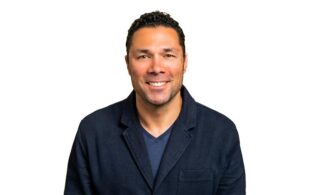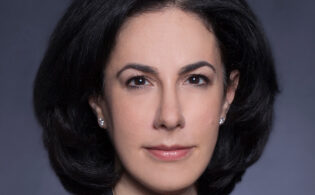A+E Networks operates a portfolio of brands in the U.S. that serves different tastes and demographics, from history buffs, TV-movie lovers and fans of reality programming to viewers who love bingeing on scripted series or are addicted to factual programming to Millennials looking for programs that reflect their worldview. A&E, HISTORY, Lifetime, FYI, LMN, VICELAND, Crime + Investigation, Military HISTORY, Lifetime Real Women and HISTORY en Español cater to passionate fans wherever they may be, on linear channels, online or on portable devices.Years ago, A+E Networks made a commitment to owning the majority of the programming it airs—a strategy that has allowed it to launch channels in the U.S. and around the world and fuel a healthy distribution business.
Years ago, A+E Networks made a commitment to owning the majority of the programming it airs—a strategy that has allowed it to launch channels in the U.S. and around the world and fuel a healthy distribution business.
As president of international and digital media, Sean Cohan oversees 85 branded channel feeds around the world and the sale of some 12,000 hours of programming. In January, he was also given responsibility for the company’s global digital media, which include websites, TV Everywhere apps, direct-to-consumer offerings and SVOD partnerships. He is looking for opportunities to roll out these products in territories outside the U.S. Just as Cohan did years ago with programming, urging the company to be global and include international in as many contexts as possible, he says he is now taking great joy in applying the same approach to digital, encouraging the telling of stories across all platforms.
Cohan talks to World Screen about recent and upcoming channel launches and about A+E Networks’ slate of programming for MIPCOM, from the powerful factual series 60 Days In to the innovative scripted series UnREAL to the reimagining of the groundbreaking 1977 miniseries Roots into a TV event that garnered high critical acclaim and viewership in the U.S. this past May and is selling around the world.
WS: The original Roots was a major television event and the new production was even better in numerous ways.
COHAN: We referred to Roots as a reimagining. It was topical—if not more topical today than it was then. We made a ton of tweaks to the original that made it even more authentic historically, whether it’s the nature of the town where the beginning of the series is set, which turned out to be a city of 10,000, or whether it’s the nature of the slave trade. We started this project a couple of years ago. Maybe we didn’t have a full appreciation for just how right the timing would be. It couldn’t have been better timing in the U.S., but I think it’s a global thing. When you think about migrants in Europe, it’s ugly right now, and identity, struggle and family are just as relevant, just as important, if not more important. I’m thrilled that Bob [DeBitetto, the president of brand strategy, business development and A+E Studios], and Barry [Jossen, the executive VP of A+E Studios], and the networks HISTORY, Lifetime and A&E took this one on.
WS: How has Roots been received internationally?
COHAN: Very well. It has sold just about everywhere, in some 200 territories, and in the handful of places where it hasn’t we’re in pretty deep discussions. It was one of those things that resonated with both trade buyers and audiences, and in places you wouldn’t necessarily expect. For example, it rated well in Malaysia and South Korea. The Philippines didn’t surprise me quite as much because there is a penchant for certain kinds of content there. I wasn’t surprised when Roots aired in South Africa and did [big] numbers. It goes back to what I’ve said many times: it’s a great story with incredible talent. For some viewers and some territories it was about this ugly truth and identity and very grand themes that resonated. For other people in other cultures, it was just about a ridiculously good-looking, big-budget TV event that had A-list talent.
WS: Roots had great resonance for you personally.
COHAN: It’s very rare to find moments where what makes sense professionally, what you’re passionate about and has been formative for you personally, and what will make an impact on society all conspire and line up. When I think about what Roots was in the late ’70s—I grew up in a not very diverse place, and I had a different ethnic background than most of the folks that I was with. Identity formation for adolescents is hard enough, but I struggled even more because it’s difficult to be an African-American Jew in a homogenous community. And maybe I personalize it a little too much, but seeing Roots as an African American was a formative experience. I’m the same age as folks who saw [the original] and felt that same relevance, poignancy and formative kind of feeling; there are big parts of my and other people’s identity that you could find in Roots. The interesting thing is that there is a generation that didn’t see it. When you listen to [executive producer] Mark Wolper talk about the original Roots, he tried to make his kids watch it and he couldn’t make them do it because it just looks very dated, even though it had a tremendous cast and was an amazing project.
WS: What other scripted shows are in the pipeline?
COHAN: Roots was our singular message at MIPTV. At MIPCOM it’s leadership by committee, and we have an embarrassment of riches. We’ve got the eight-part military drama SIX, which is from our studio and The Weinstein Company, but our team is selling it. We’ve got Jeremy Renner’s Knightfall, about the Knights Templar, and season three of UnREAL, which is the buzziest show that Lifetime has ever had. We also are growing formats in a big way and have an incredible new slate, as well as our ever-popular movies. We think of ourselves as the market leader not only in the volume of quality movies but also in the big events, be it ripped-from-the-headlines movies, crime pieces or biopics.
WS: 60 Days In is a breakout hit for A&E, isn’t it?
COHAN: Over time, it gets harder to break hits, so we’re thrilled that 60 Days In is a hit. More than that, it’s thrilling to bring something [to the market] that is different and elevates the stakes of the game. It’s a genre-defining take on the prison system. We’ve always worked at and invested in pretty close relationships with law enforcement. All that said, it’s simply great TV. As an interesting update, formats are a big area for us heading into MIPCOM. One of those titles we are very bullish on, in fact, is 60 Days In. We’ve partnered with Pulse in the U.K. and are working with other markets to roll this format out globally.
WS: What other factual shows will you be bringing to MIPCOM?
COHAN: Born This Way is in its second season. I have a bit of a personal connection to it because I have a younger sister who has Down Syndrome. It’s a risky show, a little different and a little bold, but it does justice to the topic and treats it with such dignity—it’s so endearing. We also have Alone, a recurring show, which is a fresh take on survival and competition reality, and we have our docudramas and specials, shows like Barbarians Rising.
Crime programming is an area that we are going to be talking about a fair amount. We have some really interesting new entrants to this genre beyond 60 Days In. We’ve had a great run with The First 48, but we also want to look back and pay some respect to the folks that came before us at A&E who were the originators of the genre. With that in mind, we are bringing back and reinventing shows like Cold Case Files. We’re committed to true-crime and true-justice programming that is not salacious but forensic and analytical in thought, like Dick Wolf’s show Nightwatch. There are audiences for true crime and justice if you can find different ways into the storytelling. We have big plans for rebranding the Crime + Investigation channel along the same lines.
WS: Speaking of channels, what are some of your recent and upcoming launches?
COHAN: The recent ones are FYI in India and our first free-to-air channel in Turkey with Lifetime. Amanda Hill is our international chief creative officer and one of the things she and the team have been working toward is transforming Lifetime and HISTORY outside the U.S. An important part of the DNA of Lifetime going forward is this concept of empowering women and the strength of women through an entertainment lens. What’s been interesting, and is borne out in the Turkey example, is that whether you use the word feminism or whether you’re using strength in a female context, they’ve got very different meanings from one market to another. So it’s been nuanced but also intellectually and professionally interesting to think about and position brands by market, trying very hard to build and maintain a global brand that stands for the same things everywhere.
We’re launching a free-to-air network in September in the U.K. It’s a new global brand for A+E Networks, called Blaze. It is accompanied by a couple of digital extensions as well. It’s daunting enough to launch a free-to-air brand in the U.K., one of the most crowded and mature markets in the world, so we felt the need to expand it onto other platforms. Blaze will include content from a range of our networks. The linear channel will have more than 20 million subscribers and simultaneously we will be launching a TV Everywhere product across iOS and Android.
WS: You are also responsible for digital media. How are you going direct-to-consumer with some of your brands?
COHAN: The two forays into quasi direct-to-consumer so far in the U.S. have been Lifetime Movie Club and HISTORY Vault. I say quasi direct-to-consumer because we partner with a series of platforms to bring them to consumers, be it Apple, Roku, Amazon, Comcast or the like. The idea for both is that they are complementary to our linear channels. Some services out there, especially the premium-cable networks, are trying to bring consumers a replacement or a substitute for their channels. For us, it’s about bringing the brand and a mass of content that maybe viewers aren’t seeing on the channel and that speaks more to the enthusiastic fan base. The Lifetime Movie Club includes ripped-from-the-headlines movies, biopics, crime, women in peril and other [genres]—a lot of classic Lifetime movies and a lot more recent ones. It offers a new-to-the-service movie a day. It’s about super-serving that rabid fan of Lifetime movies and doing it across platforms and allowing people to watch wherever, whenever and however they want. That service has gotten good traction, and we are learning about that business and doing things more directly with consumers. We are understanding Lifetime’s value to consumers and churn—things that maybe our distributors and pay operators are more familiar with—and that has been really interesting. We launched Lifetime Movie Club about a year ago in the U.S. and HISTORY Vault about four months ago in the U.S. We also launched HISTORY Vault in Canada on the same day that it launched on certain platforms in the U.S. We’ll be launching these products elsewhere in the world.
WS: You have a new studio, 45th & Dean.
COHAN: Yes and to explain the etymology, our offices are on 45th Street in Manhattan. Our physical studio is on Dean Street, hence the name 45th & Dean—it’s a bit of traditional media meets new media. The genesis of this is that while we were thinking about disruption, we recognized that we were disrupting ourselves in lots of different places inside of our company. We were making lots of interesting short- and mid-form content, but we weren’t doing it in as coordinated and ambitious a way as we could. So 45th & Dean represents a centralization and a build-up of what we think we should be doing in short- and mid-form storytelling—that’s anything from a 6-second vertical piece to a 15-minute piece that has gone or will go on our linear channels. The conceit behind 45th & Dean is that we’re producing for very different audiences and we need to be producing for different platforms in a bespoke and creative way at the outset, rather than retrofitting or repurposing. It’s incumbent upon us that when we come up with a great idea, whether it’s from 45th & Dean or one of our networks, we flesh it out for different audiences and different platforms before we do anything. And it’s thinking about that also with regard to interesting creative advertising ideas from the outset. That’s the content component of 45th & Dean. We are aiming to make great short- and mid-form stories. Some will reside on Snapchat, Facebook or Instagram and some will be on linear or set-top box VOD.
The other piece is the social and analytical component of 45th & Dean. Refining the company for the future, we looked at how we interact with social media, both on behalf of our brands and shows and without a connection to our shows. We centralized the social-media function in 45th & Dean and added a couple of analytics folks with an eye toward being both a creative engine and a client-service engine for internal and external clients in the form of agencies. It’s creating a circle where we create short- and mid-form stories, push them out on social media or our own platforms and we measure how they do. 45th & Dean is run by Paul Greenberg, who reports to me. He’s a digital native who last ran Nylon magazine as CEO and also runs FYI domestically.
WS: At MIPCOM you are planning a Diversity Summit. Tell us about that.
COHAN: It’s an overall look at and a celebration of diversity in the global media industry. It’s a natural complement to and done in the same spirit as what we are doing with the Women in Global Entertainment Power Lunch. The Diversity Summit grew out of a grassroots effort by a small cadre of folks—not including myself; it came to my attention about a year ago—who would get together at each market. It started with a small group of people of color. Diversity carries with it different meanings across different markets. I thought, in the wake of Roots, in the wake of the grassroots effort that had been out there and particularly in the wake of hearing some really strong words at the last diversity gathering during MIPTV from LeVar Burton [an executive producer on the new Roots and star of the original miniseries] and Anika Noni Rose [actress in Roots], it was high time for us to do something speaking to and celebrating the importance of diversity, not only on screen but behind the camera and in the executive suites. This is one of the great moments where what I believe is important personally and what makes sense from a business perspective come together because having diverse people in the industry doesn’t hurt your ability to reach increasingly diverse audiences.
We are working with Reed MIDEM and others on the Diversity Summit, taking advantage of the fact that there is a critical mass of thought-leaders, decision-makers and executives in one place.






